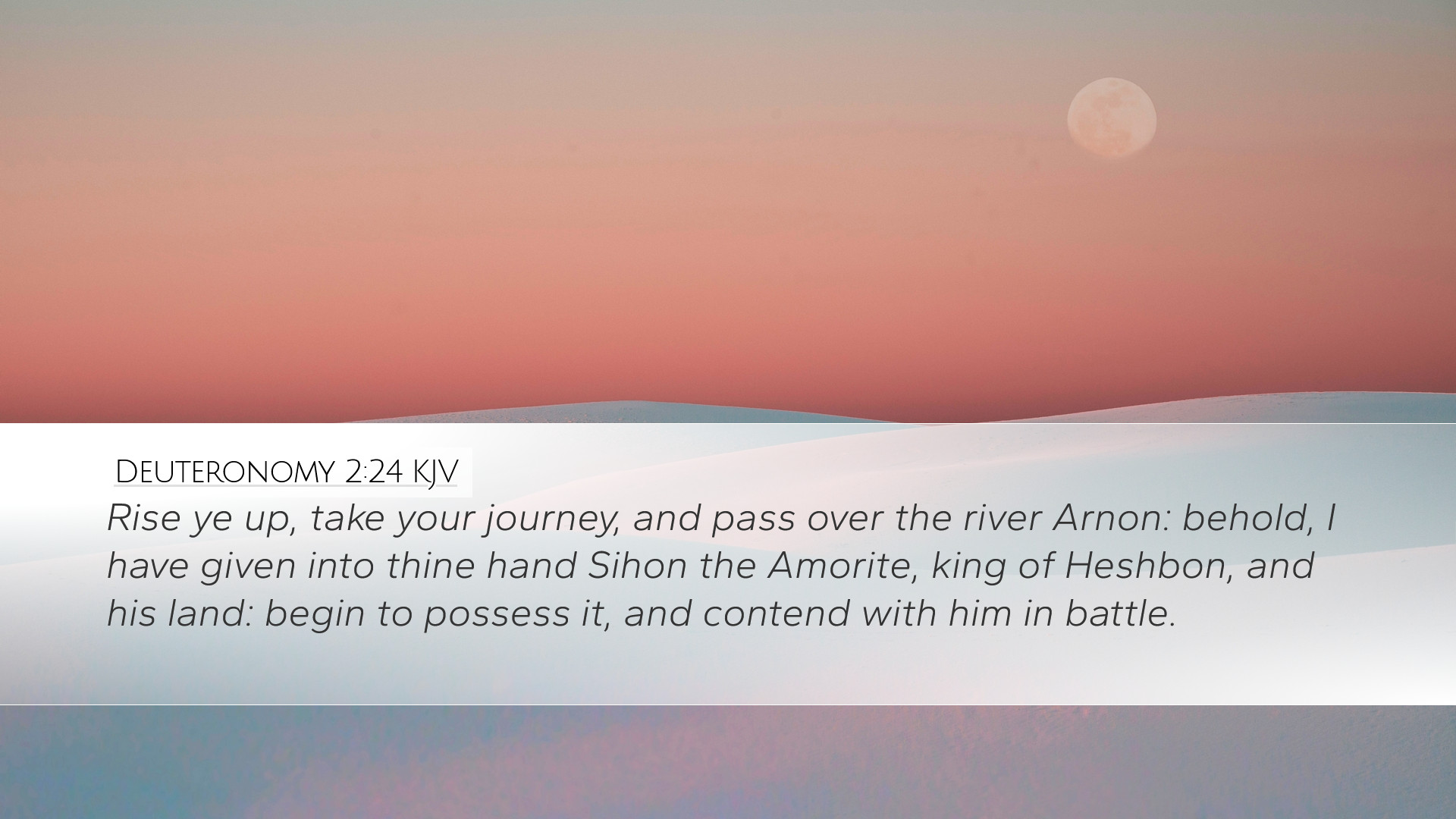Commentary on Deuteronomy 2:24
Verse Analysis: Deuteronomy 2:24 states, “Rise ye up, take your journey, and pass over the river Arnon: behold, I have given into thy hand Sihon the Amorite, king of Heshbon, and his land: begin to possess it, and contend with him in battle.” This verse marks a significant transition in Israel’s journey, as they are called to enter and possess the land that God has ordained for them.
Historical Context
To fully grasp the weight of this directive, one must understand the historical backdrop against which it is proclaimed. The Israelites are on the brink of entering the Promised Land after a long journey through the wilderness. The mention of the river Arnon signifies a geographical and metaphorical crossing into new territory, symbolizing a departure from past wanderings and an entry into divine promise.
- God’s Commandment: The command given by the Lord signifies both an invitation and a challenge. The phrase “Rise ye up” suggests urgency and assurance, highlighting the necessity for action in faith.
- The River Arnon: The Arnon River represented a significant boundary marker. Crossing it symbolized a shift from the wandering years into a more fortified claim of land that had been allotted to them.
- Confrontation with Sihon: Sihon, the king of the Amorites, represents the hostile powers that occupy the land. Here, God not only assures them of victory but also instructs them to "contend" which showcases the reality of spiritual warfare.
Theological Insights
This passage addresses profound themes relevant to theology, particularly concerning divine sovereignty, human agency, and the challenges inherent in fulfillment of God’s promises.
- Divine Sovereignty: God clearly asserts His control over the destinies of nations. He declares that He has given Sihon and his land into the hands of Israel. This reminds us that God is orchestrating history according to His purposes.
- Human Agency and Divine Command: Though God has granted victory, the command to engage in battle underscores the expectation of active participation. It reflects the balance between divine provision and human responsibility.
- Faith and Action: The call to “begin to possess” implies that faith must be accompanied by action. The Israelites are to act on their faith, trusting God's promise as they confront their enemies.
Insights from Matthew Henry
In his commentary, Matthew Henry emphasizes the importance of moving forward in obedience to God's directives. He underlines that God's promises often require the people of God to take the initiative, illustrating that spiritual progress necessitates both faith and courageous action. Henry also notes the significance of the specific enemies mentioned, as they represent spiritual obstacles that believers must confront.
Insights from Albert Barnes
Albert Barnes' annotations highlight the sociopolitical realities of the time. He discusses how God's promise of victory over Sihon is not merely a concession but a divine endorsement of Israel's right to the land. Barnes elaborates that victory is assured for those who obey, pointing out that the effective engagement in battle symbolizes the larger spiritual battles that believers face. He elucidates that those who are diligent and adhere to God’s settlements will ultimately experience His faithfulness.
Insights from Adam Clarke
Adam Clarke elaborates on the significance of the land claimed from Sihon as part of the broader fulfillment of the covenant with Abraham. He underscores that God’s directives are clear and decisive, reinforcing the notion of God's ongoing relationship with His chosen people. Clarke also appreciates the underlying theme of courage within the directive to fight, recognizing that although the battles are daunting, they are also divinely assured victories.
Application for Pastors and Theologians
For those in pastoral roles and theological studies, Deuteronomy 2:24 serves as a profound reminder of the duality of God's promise and human action. As leaders and scholars, one can draw parallels between the Israelites' journey and the current journey of faith that believers undertake today.
- Encouragement for Action: Pastors can encourage congregations to step out in faith, emphasizing that growth in spiritual maturity involves facing and overcoming present challenges, much like the Israelites confronted Sihon.
- Understanding Spiritual Warfare: This passage can initiate discussions about the nature of spiritual battles in ministry. Just as the Israelites engaged in physical battles, modern believers grapple with various spiritual strongholds that require prayer, preparation, and intentional action.
- Faith in God’s Promises: The assurance of divine support in battles brings comfort and confidence. It is vital to teach that while life will present adversities, God’s promises stand firm as motivation for perseverance and commitment.
Conclusion
In conclusion, Deuteronomy 2:24 encapsulates a moment of pivotal transition and divine assurance for the people of Israel. Its rich theological implications and practical applications render it a valuable text for pastors, theologians, and students of scripture. It calls believers to rise with faith in God’s promises while actively engaging in challenges that lie ahead, reassuring them that the Lord is with them in their spiritual conquests. The insights derived from the commentaries of Matthew Henry, Albert Barnes, and Adam Clarke deepen our understanding and encourage a faithful response to God's commands.


